| Reviews & Columns |
|
Reviews DVD TV on DVD Blu-ray 4K UHD International DVDs In Theaters Reviews by Studio Video Games Features Collector Series DVDs Easter Egg Database Interviews DVD Talk Radio Feature Articles Columns Anime Talk DVD Savant Horror DVDs The M.O.D. Squad Art House HD Talk Silent DVD
|
DVD Talk Forum |
|
|
| Resources |
|
DVD Price Search Customer Service #'s RCE Info Links |
|
Columns
|
|
|
Premiere Frank Capra Collection, The
THE MOVIES:
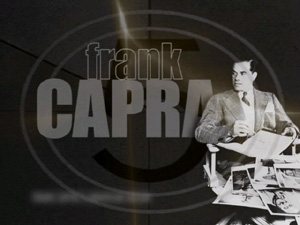
"Of or evocative of the movies of Frank Capra, often promoting the positive social effects of individual acts of courage." - the definition of "Capraesque," as stated by the American Heritage Dictionary
"[Frank Capra] made you pay for those happy endings." - Jimmy Stewart
I find that most -esques are misunderstood and misused as time wears on, so I was surprised to do a quick Google search on "Capraesque" and find the above definition at the top of the list. I would say that, based on the newly released Premiere Frank Capra Collection, it's a relatively accurate summation of what makes a Frank Capra movie tick. Usually, when I see the tag bandied about, the intention is to suggest that a movie is overly optimistic, that it shows a particularly cheery view of life where someone triumphs and learns a moral message. This particular shading is based primarily on It's a Wonderful Life, and it has some basis in truth. It's just not the whole enchilada.
The Premiere Frank Capra Collection consists of five Capra films from his pre-WWII period. It's a Wonderful Life came seven years after the last film in this compilation, but all of its important components were starting to be designed as early as 1932, when the director helmed American Madness, part of a string of movies at Columbia Pictures that would embody the true definition of Capraesque.
The more nuanced explanation of what that descriptive entails is as follows: in a Frank Capra movie, there is a clear distinction between the little man and the big man. Any big man who crosses over to try to lend a helping hand to the little man will often be scorned as crazy. Usually, the enemies of such social upheaval are the powers that be in business, the moneymakers who have no concern for the well-being of the common populace, not so long as their coffers are still being lined. When the hero goes up against these paragons of business, it's not just an economic battle, but one of common sense vs. a world gone mad. When the do-gooder is on the brink of absolute ruin, he discovers that his efforts have touched more people than he could ever have dreamed, and his friends and those who have clasped their needy mitts in his helping hand rally to rescue him from destruction.
That is probably the true message of a Capraesque movie, from American Madness all the way through the four other films in The Premiere Frank Capra Collection and onward into the movies not covered here, including Wonderful Life. No man is poor that has friends. Many of the famous Capra characters say as much. In American Madness, Walter Huston's banker argues for extending loans to those in need because they are decent people who will help the greater good in return, and the message is locked right in the title of You Can't Take It With You. But perhaps Gary Cooper sums it up best as the eponymous Mr. Deeds in Mr. Deeds Goes to Town. As he looks over the New York skyline, lost deep in the romance of the city and Jean Arthur, he wonders what a great world it might be if folks everywhere just remembered to like each other. In Capra's way of things, the mob is its own worst enemy as well as the greatest agent of change. It's all a matter of choice. It could just as easily go bad, and it's up to an individual dreamer to be the catalyst for it going right.
That's actually where most modern storytellers who tilt at the windmill of Capraesque go wrong. They mistake Capra's belief in the power of the individual for a simplistic worldview. Frank Capra didn't trade in blind optimism. His characters don't stupidly grin through the rumbling as the walls tumble around them. Because in Capra's movies, the walls do indeed tumble, and the threat of failure is a real and heavy one. His heroes are often struck down as low as they can possibly go. Huston contemplates suicide, Mr. Deeds would rather be declared insane than deal any further with a savage, heartbreaking existence. To put them up against any less would be false bravado. We can only tell who you can count on by how they fare life when it's hit the absolute bottom.
The Premiere Frank Capra Collection brings together five films that show this hard-won positivity at its very best, representing the height of Frank Capra's powers. Of the five pictures, two of them won an Academy Award for Best Picture, two got Best Screenplay, and three of them scored a Director statue for Capra. In addition to those three awards, It Happened One Night also brought in honors for Best Actor and Actress, the first time one movie garnered all five of the top awards. That's some resume, and it's richly deserved. In addition to the five movies, there is also a sixth disc with the 1997 feature-length documentary Frank Capra's American Dream.
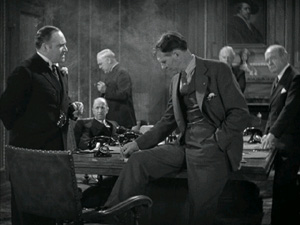
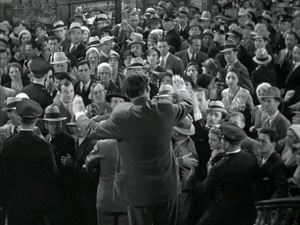
* American Madness (1932): A definitive entry in Capra's filmography, and the first of four movies on this set done with writer Robert Riskin. Set over two days in a bank, the picture concerns itself with several parallel story lines that converge in potentially disastrous ways. Walter Huston is fantastic as the head of the bank, Thomas Dickson, who runs the business based on the customer's need and not on cold formulas that his frustrated board members allege guarantee success. These greedy fatcats would love to see Dickson fall on his face, and so when one of his managers (Gavin Gordon, The Scarlet Empress) gets mixed up with some mobsters and provides them the in with which they can ransack the vault, it looks like they will finally get their chance. In a humorously staged sequence, a gossipy phone operator starts off a chain reaction of rumor, causing the bank's many customers to think their money is under threat. This starts a "run" on the bank, where account holders rush to withdraw all their funds.
Amidst all this, Dickson's marriage is also in jeopardy. His wife (Kay Johnson, Of Human Bondage) is distraught at his lack of attention, and so she is nearly stepping out with the same manager who aids the robbery. This indiscretion is witnessed by Matt (Pat O'Brien, San Quentin), the teller Dickson is grooming as his protégé. Unsure of how to handle this horrible info, Matt is nearly pinched for the robbery himself.
Dickson must deal with all of these things if he is going to keep the bank doors from closing, and he nearly gives in. His main fault is that he has lost sight of what counts. While he is doing right by the people whom he serves, he lets his personal interactions flounder. It's when the many small businessmen he has given a leg up to come to save him that he remembers that it's people who keep the world turning, and even the most noble of individuals can get lost. In a lot of ways, these elements of the movie--the run on the bank, the final collection of funds, Dickson's arguments for why banks should loan money to the people who have none--establish the archetypical elements of the Capraesque story. In particular, he would return to these plot points in It's a Wonderful Life, but the scenes where people rush out of the woodwork to stop an injustice being done to one man who has touched them all will show up again and again on the Premiere Frank Capra Collection. As usual, Walter Huston is riveting in American Madness. He is the genial boss who can also be a tiger in the boardroom, and when his world crumbles at his feet, his heartbreak is devastating to watch.
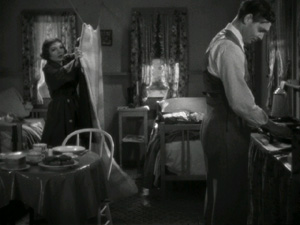
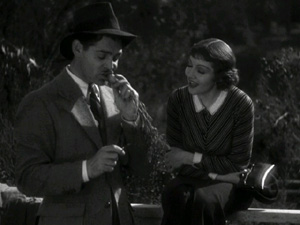
* It Happened One Night (1934): The movie responsible for Bugs Bunny! Friz Freleng has noted on several occasions that the fast-talking manner of the rascally rabbit is based on Clark Gable's performance in this picture, right down to how he eats a carrot. This is a fitting development, as It Happened One Night is often cited as setting the standard of screwball comedy.
Claudette Colbert plays Ellie Andrews, an heiress who has eloped with a rich aviator. When her father (Walter Connolly, Twentieth Century) vehemently disapproves, she runs away, starting an interstate search stretching from Miami to New York. On her bus ride, she meets Peter Warne (Gable), a tough-as-nails, take-no-crap reporter who begins the picture quitting his job during a drunken phone call. Realizing who Ellie is and seeing she has no idea how to function in the real world away from daddy's money, he attaches himself to her and promises to get her to her husband if he can write the exclusive story. Their many high-speed arguments are delightful, and the pair handle the razor sharp dialogue with aplomb. They also get the emotion right, and filmmakers and actors are still trying to replicate the way Peter and Ellie go from hating everything about each other to being absolutely in love.
In It Happened One Night, the social element isn't nearly as prevalent. The ills of Depression-era America do show up, particularly when the couple donates the last of their money to a starving mother and child on the bus, but this is more of a private revolution. Ellie is going to have to learn to be a real person, to care about what happens around her, something even her father will push her towards. He'd rather see her follow her heart than hook up with some oily flyboy. Capra and Riskin play it smart, avoiding one-dimensional characters. Peter believes in the common good, but he's also not above being self-serving, and though Ellie is out of touch, she has a heart. Being able to capture multiple dimensions is why Capra and Riskin's work together still endures.
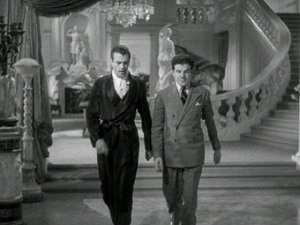
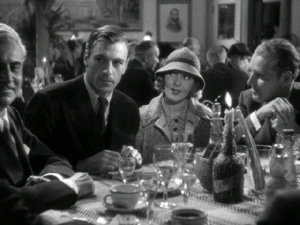
* Mr. Deeds Goes to Town (1936): Watch this and then remember that Adam Sandler remade it, and see if you don't suddenly favor capital punishment. The hubris!
In the original, Gary Cooper is Mr. Deeds, a regular Joe from small-town America who has suddenly inherited an obscenely large fortune. A poet who writes homilies for postcards, he has never travelled outsdie the boarders of his hometown in Vermont, and so when he's ferried to New York City to take care of business, Deeds is pretty far out of his element. His bodyguard Cobb (Lionel Stander, later famous as Max on "Hart to Hart") tries to steer him straight, and Deeds quickly sees his lawyers aren't as magnanimous as they pretend; yet, it's not going to be long before Deeds finds himself in trouble. He's got more good sense than the whole of the city, but he grows weary of their snarky assessment of this situation. Things also heat up considerably when his nightly exploits start showing up in the paper and he is given the cruel nickname "Cinderella Man." Little does he know that Mary, the woman he is falling in love with, is really Babe Bennett, the reporter who is sticking it to him. Played by Jean Arthur, who would become a Capra regular, Babe/Mary is the counterweight to Deeds' conscience. As his moral fortitude drops, hers goes up, inspired by the example he sets.
Eventually, Deeds can't stand two-faced city life any longer, and he decides to give all of his money away. He establishes a program to buy farms for out-of-work farmers and before he knows it, potential candidates are lined up around the block; at the same time, his lawyers have gotten him arrested as possibly insane. He must be crazy to give up that much money, right? Broken up over Mary's betrayal, Deeds refuses to defend himself, and the bad guys almost win. It's only when Mary and all of the farmers whom he has tried to pull out of the ditch stand up for him does he find a reason to believe again and stand up for himself.
Once again, the handling of the material is amazingly smart, and Capra really makes the movie work by his expert casting. Gary Cooper has a gentle presence that plays well against his considerable size. His Mr. Deeds not only physically towers over his persecutors, but he mentally towers over them, as well. The forces of greed are no match for the basic belief in what is right for everyone.
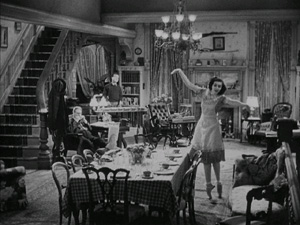
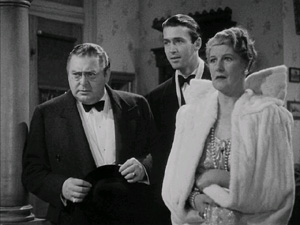
* You Can't Take It With You (1938): Adapted from a popular play by George S. Kaufman and Moss Hart, who also brought us The Man Who Came to Dinner, A Gentleman's Agreement, and the Judy Garland version of A Star is Born. Their text provides Capra and Riskin with their largest central cast to date. Jean Arthur returns as Alice, the most stable member of the eccentric Sycamore family. When she becomes engaged to Tony Kirby (Jimmy Stewart, another Capra mainstay), the son of a wealthy financier, the fun-loving, free-living Sycamore family comes face to face with the uptight Kirby family. The two clash over issues of class, finance, and social propriety, and the question of whether or not the two can coexist is integral to whether or not Tony and Alice can really get married.
It took me a little while to warm up to You Can't Take It With You. The Sycamore family was a tad too obnoxious to stomach at first, almost like the Addams Family but without any of the cool creepy stuff. I came around largely due to the performance of Lionel Barrymore as the clan patriarch, Grandpa Martin. He sets the tone for their crazy lifestyle. As a former businessman who left the life of high finance for a life of high relaxation, he can school the Kirby patriarch, A.P. (Edward Arnold, Man About Town) in the loneliness that is the product of living your life as a series of acquisitions and mergers. You Can't Take It With You is actually more about those two than it is about the love affair between Tony and Alice. Grandpa Martin is the quintessential Capra man, and he has to teach A.P. to live as the Sycamores do.
Once I got past the initial noisiness of the Sycamores (as well as the hypocrisy of their household: it's all right for them to do as they please as long as they have black servants making it all possible), I started to really enjoy You Can't Take It With You. The role of Tony seems tailor-made for Jimmy Stewart. The boy is caught between two worlds. He has the sort of dreams you can only pursue as a Sycamore, but the sense of responsibility you get saddled with when you try to be a Kirby. The scenes of him wooing Jean Arthur when they are on their own, away from both families, are funny and charming, and next to the clash of the two older men, Tony's wrestling with his own soul is the main attraction of You Can't Take It With You.
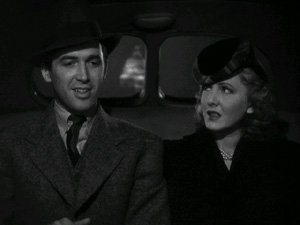
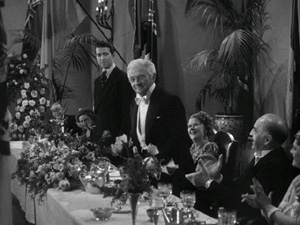
* Mr. Smith Goes to Washington (1939): Perhaps the greatest Goliath you could have in a David and Goliath story is the government. For Frank Capra and screenwriter Sidney Buchman (Holiday), if the United States is a democracy built for the people and by the people, then when it goes awry, it's up to the people to fix it. In Mr. Smith Goes to Washington, Jimmy Stewart plays Jefferson Smith, a leader of a Boy Scouts-like organization. When one of his state's senators dies suddenly, Smith is appointed to the vacant seat as a sort of political patsy, a puppet for the remaining senator, Joseph Paine (Claude Rains, Casablanca) and the true backroom mastermind, Jim Taylor (Edward Arnold again), a kind of Karl Rove of his day.
Being a Capra movie, what no one figures on is Smith's down-home manner being a reservoir of true wisdom. Never before having been to Washington D.C., but being a history buff, he's awed by the city's monuments. His "aw shucks" demeanor is quickly pounced on by cynical reporters and his initial supporters all quickly turn from him, much like the story arc Mr. Deeds went through. Also like Deeds, Smith is a minor victim to the dual devotions of Jean Arthur. As Saunders, the ambitious political aide, she is set up as Smith's assistant in order to further the goals of her political party and secure herself a place in the Administration when Paine moves on to the White House. Naturally, she begins to see that Smith's uncommon patriotism is not a product of stupidity, but a genuine fount of emotion that modern politicians have long since forgotten. Her role will end up being the same as many of Capra's heroines: when Smith is beaten and ready to give up, it's Saunders who will give him the courage and the means to carry on. His faith in something greater gives her a new reason to believe, and she returns the favor.
Smith's near downfall comes when he uncovers the corruption of Paine and Taylor and attempts to expose it. They do a frame job on him to make him look corrupt himself, and Smith striking back is one of the most famous scenes in cinema history. Staging a one-man filibuster, Smith talks for a full day, giving everything he has in him to try to make his fellow senators see that they have lost their way. Stewart is remarkable in this scene, conveying the deterioration of body and voice while maintaining the resolve of Smith's spirit. While his brand of patriotism may seem strange to us in the '00s, when we would hear about the graft scandal the junior senator uncovers as everyday news, for the end of the '30s, at least in Capra's world, it's got a kind of quaint appeal. While earnestness and honest intentions can be a lesser artist's downfall, it's the fuel that runs Frank Capra's motor, making Mr. Smith Goes to Washington as inspirational today as it was nearly seventy years ago.
* Frank Capra's American Dream (1997): Ron Howard narrates this feature-length documentary about the filmmaker made for the American Movie Classics cable channel. It features a host of critics, colleagues, and contemporary actors and directors discussing their love of Capra's movies. The roster of directors alone is impressive: Martin Scorsese, Robert Altman, Oliver Stone, Arthur Hiller, John Milius, Amy Heckerling, and many more.
The documentary traces Capra's life from a young Italian immigrant growing up in California to his early days as a director, the films he made for Columbia, his service in WWII making films for the Army, the post-war success, and his twilight years. Where Frank Capra's American Dream succeeds tremendously is in rooting out the various events that influenced the director's world view, how an incredibly complex person came to make movies about such complex ideals. In many ways, his heroes were cast in his own image: a man who fought on despite self-doubt and personal failure, who wasn't sure he believed in what he was fighting for but had to see it all the way through. It's a fitting capper for the Premiere Frank Capra Collection, bringing the definition of "Capraesque" all the way to the front as not just an genre aesthetic, but one man's personal storytelling philosophy.
THE DVD
Video:
All of the movies in the Premiere Frank Capra Collection are full frame, black-and-white, and have fairly decent transfers. All have at least one or two moments of soft lines or scratches, but for the most part they come through fine. Some scenes in Mr. Deeds have strange, translucent white spots, almost like someone is shining a light onto the screen, and You Can't Take It With You has a lot of random moments of a brief, sliding pause just before Capra cuts a shot--but those are the worst of the flubs and not so bad.
Sound:
The movies don't have any fancy sound mixes, but the audio tracks are clean.
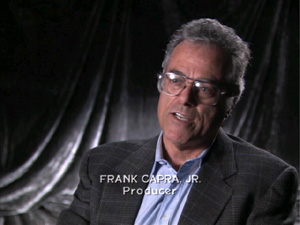
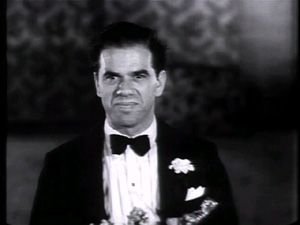
Extras:
Sony and Columbia Pictures would almost have you believe that there are no extras on these discs. Outside of a very brief mention on the slip of paper stuck to the back cover, nowhere on the package do they point out that each of the five Capra films has a commentary track and a film-specific documentary from a series called "Frank Capra, Jr. Remembers." The documentaries range from 10 minutes to nearly half-an-hour long, depending on the movie. Capra, Jr. narrates and talks on camera, going over the history and construction of the film, showing promotional stills, advertising images, and clips from each one. All of the shorts give insightful accounts of the film from conception to completion.
Capra, Jr. is also on all of the commentaries. Two of them--American Madness and You Can't Take It With You--he shares as a dialogue with Cathrine Kellison, an author and adjunct professor to New York University. They both are passionate about Frank Capra, Sr.'s oeuvre. Kellison's main role is drawing out stories and adding additional information about other members of the cast and crew, things that aren't specifically Frank Capra. Though Capra, Jr. is more energetic when talking with someone else, the son does all right on his own, too, mixing personal knowledge, historical facts, and quotes from his father's autobiography. He's good on screen and on the microphone, making for lively commentaries. That is, when he does talk. When flying solo, he tends to pause during a scene and say nothing for prolonged periods of time. The information given in the documentaries and the commentaries are, for the most part, repeated from one to the other, too, so if you want the concise version, go with the documentaries.
After the two basic features that are on all the movie discs, there are also additional features on others. It Happened One Night has the most, with a gallery of movie posters and lobby cards, the original theatrical trailer, and a radio broadcast version of the story with the original stars. Mr. Deeds Goes to Town and Mr. Smith Goes to Washington have promotional galleries, as well, and Mr. Smith carries the theatrical trailer.
I should note that the features on It Happened One Night, Mr. Deeds, and Mr. Smith were available on previously released single-disc versions. I don't have access to those editions, so I can't speak to whether or not these are new transfers, I can just say the jacket materials claim that they are. The previously barebones You Can't Take It With You DVD definitely gets an upgrade, however, and American Madness is exclusive to this set.
The sixth disc, the documentary Frank Capra's American Dream, has four bonus featurettes: "Conversations with Frank Capra, Jr.: A Family History" (25 mins.), "Conversations with Frank Capra, Jr.: The Golden Years" (18 mins.), "Frank Capra: Collaboration" (19 mins.), and "The Frank Capra I Knew" with Jeanine Basinger, the curator of his archives (13 mins.). These all appear to have been made around the same time as the "Frank Capra, Jr. Remembers" programs, and run along the same level of solid detail, but with more voices speaking than Capra, Jr. The "Collaboration" featurette is the most interesting, exploring the relationship between the director, his main writer on the movies in this set, Robert Riskin, as well as other regular components of the Capra machine.
The entirety of Frank Capra's American Dream is presented without chapter breaks or scene selections.
The DVDs are held in a foldable, shiny sleeve with plastic trays that fits into a slipcase with the Premiere Frank Capra Collection Movie Scrapbook, a handsome squarebound book with information about each film. It is liberally peppered with photos, vintage advertising, and quotes directly from Frank Capra's autobiographical writings, along with personal photos from the Capra family, pages of script from Mr. Smith, and a filmography of Capra's achievements at Columbia, where all of these movies were made.
FINAL THOUGHTS:
DVD TALK COLLECTOR SERIES. The five classic motion pictures in the Premiere Frank Capra Collection are enough to sell any DVD set all on their own. They are all winners. That the collection is also decked out with bells and whistles, with a focus on giving the consumer a full understanding of Frank Capra the man and artist, really makes it an exceptional purchase.
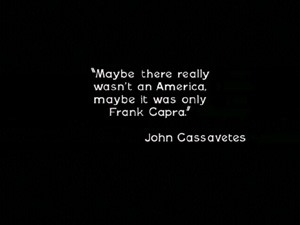
Jamie S. Rich is a novelist and comic book writer. He is best known for his collaborations with Joelle Jones, including the hardboiled crime comic book You Have Killed Me, the challenging romance 12 Reasons Why I Love Her, and the 2007 prose novel Have You Seen the Horizon Lately?, for which Jones did the cover. All three were published by Oni Press. His most recent projects include the futuristic romance A Boy and a Girl with Natalie Nourigat; Archer Coe and the Thousand Natural Shocks, a loopy crime tale drawn by Dan Christensen; and the horror miniseries Madame Frankenstein, a collaboration with Megan Levens. Follow Rich's blog at Confessions123.com.
|
| Popular Reviews |
| Sponsored Links |
|
|
| Sponsored Links |
|
|
| Release List | Reviews | Shop | Newsletter | Forum | DVD Giveaways | Blu-Ray | Advertise |
|
Copyright 2024 DVDTalk.com All Rights Reserved. Legal Info, Privacy Policy, Terms of Use,
Manage Preferences,
Your Privacy Choices | |||||||














